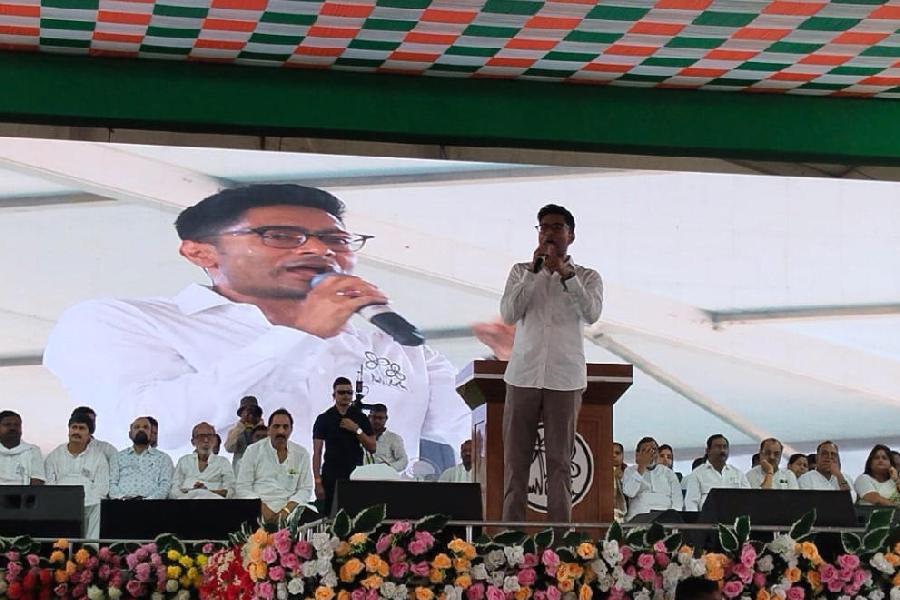Face off
Sir — Artificial Intelligence, experts assure, is only as dangerous as the people using it. It is worrying then that the Forrest Gump actor, Tom Hanks, shared a photo of an AI avatar of him that was being used by a dental company. The actor said that it was unconnected to him and had been used without his permission. Deepfakes have long taken over social media, with hundreds of videos featuring deepfakes of actors doing disturbing things. But Hanks’ case shows that such deepfakes have real-world implications. Using a deepfake image to promote a dental clinic seems benign when one considers the other repercussions of identity theft. At a time when facial recognition is being used by banks and airports, the visual accuracy of deepfakes is scary.
Subir Sarkhel, Calcutta
Sense in nonsense
Sir — Sukanta Chaudhuri successfully rekindled fond childhood memories through his article, “Free spirits” (Oct 2). Generations of Bengali children have grown up reading Sukumar Ray’s Abol-tabol. From reciting the poems at cultural events to naming food joints after them, the poems and their characters like Huko Mukho Hyangla have heavily influenced the Bengali lifestyle and vocabulary. Archetypal characters like Gangaram and Kumropotash are also often used to poke fun at people.
Alok Ganguly, Kalyani
Sir — Sukanta Chaudhuri has aptly linked the poems in Abol-tabol to our mindscapes. It would be unwise to discard these poems simply as whimsy as they use powerful satire to mock the powers that be.
Sanjit Ghatak, Calcutta
Sir — Despite the comparisons that Sukanta Chaudhuri draws between Sukumar Ray and the likes of Lewis Carroll, Abol-tabol remains incomparable in structure, content and vocabulary. But one must know Bengali to be able to truly appreciate these poems.
Ganesh Sanyal, Nadia
Sir — Sukumar Ray not only created a treasure trove of short stories, plays, novels and poems but was also a pioneer of nonsense rhymes in Bengali literature. Although primarily read by children, the poems highlighted the larger socio-political context of the times. “Ekushe Ain”, for example, reflects on bizarre punishments meted out for imaginary crimes, much like the arbitrary arrests of activists and journalists in this country. Ray’s novel, HaJaBaRaLa, brings together an array of nonsensical elements. A deeper inspection of these would reveal Ray’s criticism of societal hypocrisies.
Kajal Chatterjee, Calcutta
Equitable share
Sir — Goods and Services Tax collections have increased by more than 10% in September 2023 compared to the previous year indicating positive growth for the economy. The Centre should release the requisite funds to the states, especially those ruled by the Opposition. Funds should be allocated wisely according to the needs of each state instead of engaging in favouritism.
M.C. Vijay Shankar, Chennai
True meaning
Sir — Rahul Gandhi recently reflected on the essence of being a Hindu, explaining that Hinduism belongs to no one and yet accepts anyone who chooses to embrace it. Although the Vedas propose several virtuous ways of leading life, very few truly emulate these ideals and, instead, engage in hatemongering. India is transforming into a Hindutva-majority nation and, in the process, is becoming an intolerant, bigoted country that has a long way to go before embracing the ideals of Hinduism.
Abhijit Chakraborty, Howrah
Sir — Rahul Gandhi’s argument that the virtues of compassion and camaraderie, truth and non-violence constitute the core of Hinduism is not only correct but also extremely important given the divisive times we live in.
Preeti Chauhan, Ujjain
Holistic care
Sir — Strong and holistic healthcare infrastructure is critical for wiping out tuberculosis. A centralised healthcare management system that can provide diagnosis, doorstep medicine delivery, emotional, social and medical care to the elderly and counselling sessions for patients and their families will go a long way towards boosting recovery rates. Around 25 lakh people contract tuberculosis, leading to almost 1,000 deaths every day in India. Symptoms of cough, fatigue and weight loss, which are especially common among the elderly population post-Covid, make diagnosis of TB harder.
Dimple Wadhawan, Kanpur
Healing touch
Sir — It is laudable that Katalin Karikó and Drew Weissman, the scientists who invented the vaccine for Covid-19, were awarded the Nobel Prize in medicine. After the outbreak of the pandemic, the vaccines were developed at a record speed, saving millions of lives. The vaccines allowed society to return to normal. Through their fundamental discovery of the importance of base modifications in mRNA, these Nobel laureates critically contributed to resolving one of the biggest health crises of our time.
D. Bhattacharyya, Calcutta
Too much noise
Sir — While Mahatma Gandhi’s birth anniversary is often used as an occasion to organise cleanliness drives, little thought is given to the rising noise pollution in urban areas. Puja pandals usually blare loud music without being subjected to any legal action. Deafening election campaigns and religious festivals must be curbed and noise must be treated as a serious form of pollution.
Avinash Godboley, Dewas, Madhya Pradesh










